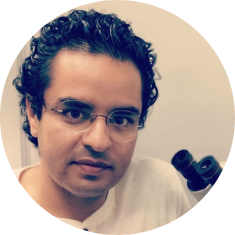
Saeid Tabatabaei
Role: HQP Scholar
Degree: PhD
Primary Faculty Advisor: Jeff Caswell
Project: Role of Abnormally Regulated Inflammatory Responses in Development of Bovine Respiratory Disease
Department: Department of Pathobiology, OVC
What inspired you to pursue your current degree?
The diversity and complexity of animals have always been fascinating for me, but this causes difficulty in developing preventative and therapeutic approaches for diseases. I found that getting training in the discipline of pathology will allow me to systematically understand animal illnesses required to improve human and animal health.
What about your research area excites you?
There are several similarities between bovine respiratory disease (BRD), which is the topic of my research, and respiratory illnesses of humans. So, cattle can be good natural models to study the basics of respiratory disease and inflammation in humans. This is exciting for me since it provides an opportunity to link sustainable agricultural research (with the goal of improving animal health) to translational medicine (aiming to understand human diseases and develop proper treatments).
What challenges do you find in your research, and how do you try to overcome them?
Bovine respiratory disease is complex, and many factors and microbes are involved in it. This makes it challenging to understand the mechanism of respiratory illness in cattle. One of my Ph.D. project goals is to develop a combination of biologically relevant in vitro and in vivo experiments allowing us to understand the cellular and molecular mechanisms of this disease.
How would you describe your research and the implications of your project?
Bovine respiratory disease (BRD) is the most economically significant disease affecting the beef industry. BRD risk factors (weaning, stress, and viral infections) have been considered to impact immune responses negatively and are critical determinants of why some cattle remain healthy while others develop pneumonia. My research aims to expand our current knowledge about dysregulated inflammation by using in-animal and laboratory experiments under relevant controlled conditions. We need this biological information to design new approaches to prevent or treat bovine respiratory disease without using antibiotics and improve animal health and welfare.
What do you see as your next steps after completing your degree?
I want to work in the R&D sector of biotechnology or pharmaceutical industries joining the forces to develop new treatments for diseases. My ideal career goal is to become a bio entrepreneur.
What role has the HQP scholarship played in your academic journey so far?
The HQP scholarship provided me with the opportunity to attend the course on agricultural innovation. This course helped me to become familiar with current challenges and opinions around climate change and the future of food systems. I hope that under the mentorship of HQP program faculties, I can contribute to sustainable agriculture.
What are three of your favorite activities outside the lab?
I enjoy cooking and outdoor activities such as biking or hiking.
What is one important thing you have learned during the pandemic?
The covid pandemic taught me how costly and viral crises can be in our interconnected societies and how unprepared we are to prevent or control expected crises nationally and internationally.

